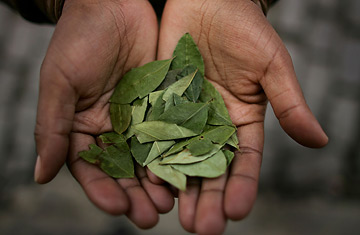
Coca leaves
"If the U.S. hadn't imposed its 'war on drugs' in Bolivia, Morales might have been just another coca farmer," says Kathryn Ledebur, Director of the Andean Information Network, a Bolivia-based NGO that advocates a change in U.S. anti-drug policy. "He rose to national prominence resisting U.S.-supervised military drug control operations."
Yet, as President, Morales is now forced to compromise with his old foe, because U.S. economic support is vital for South America's poorest nation. And nowhere is compromise more difficult for Morales than on the issue of coca itself. The leaf has a centuries-long tradition in the Andes, where it is chewed to stave off hunger and where its tea made is served everywhere from fancy hotels to rural homes. But export of the leaves beyond the region has been banned since 1961 by a United Nations anti-drug convention, because they also contain the base product for cocaine.
Whereas past Bolivian governments followed U.S. eradication orders to the letter, Morales was elected on promises to transform coca policy. "We want rationalized production," he told TIME in a May 2006 interview. "We want to industrialize the coca leaf, but we understand there can't be unlimited cultivation because the coca leaf does get diverted into cocaine."
Instead, Morales advocated state-initiated industry to mass produce and export healthy coca-based products (cookies, pasta, shampoo, wine, lotions) already manufactured on a small scale in Bolivia. The first of three state-run coca processing factories is currently under construction, with a view to turning 4,000 tons of coca into tea each year. At the same time, his government pledges ongoing eradication of excess coca, and strengthening of controls on narco-trafficking.
However, what's rational for Bolivia doesn't necessarily fly for the United States: "There's really only one good use for the coca leaf in economic terms, and that's cocaine," the U.S. ambassador to Bolivia, Philip Goldberg, told the Associated Press late last year. Bolivians denounce this stance as hypocritical, since the largest legal market for coca leaves is actually the United States.
"Coca-Cola has always used coca leaves for flavoring," says Luis Cutipa, Bolivian Director of Coca Industrialization, explaining that until 2003, Illinois-based Stepan Chemicals, which imports coca leaf under license from the U.S. Department of Justice and is reported to supply a narcotic-free derivative to Coca-Cola, bought leaves from Bolivia. Now, it buys from Peru. (The Peruvian government disclosed in 2005 that 115 tons of leaves are sent annually to Stepan.)
Coca-Cola refuses to discuss any aspect of its secret formula, while Stepan did not respond to requests to discuss its relationship with Coca-Cola. This coca without the cocaine element is the only exemption allowed by the U.N. for the plant's usage outside of the Andes and it is not clear whether patent law would allow Bolivia to use the same process as Stepan does to remove the cocaine alkaloid.
But Bolivians deem such steps unnecessary because if not chemically transformed into cocaine, coca itself is harmless. On the contrary, studies point to nutritional benefits from a leaf packed with vitamins, minerals and protein. "It's like banning corn because you don't want people to drink alcohol," says Rolando Vargas, a coca grower union leader.
Though Morales voices strong opposition to U.S. drug policy — "the cocaine problem should be combated where the usage problem actually exists: in the U.S.," he told TIME — his bark, thus far, has been worse than his bite.
His government has twice declined opportunities to formally request that the U.N. remove the plant from its blacklist — a longtime demand of coca growers and a Morales campaign promise, but an idea the U.S. has criticized. This week, Morales is sending in soldiers to help coca growers decrease their cultivation. And despite touting mass coca industrialization, the three tea factories are the only project under way, and even these still await full legal approval.
Morales' reticence is not surprising. In December, the U.S. cut military aid by 25% — from $45 million to $33 million — just days after he announced his desire to increase the legal quote of coca grown in Bolivia. It was a clear warning that divergence from set eradication goals jeopardizes tens of millions of dollars in aid and trade preferences the U.S. gives Bolivia.
So far, Morales' middle ground has allowed him to not fall totally out of favor with either his economic partner or his support base. Pressure, though, is mounting.
The U.S. claims that there's been an increase in Bolivia's cocaine-base manufacturing, drug trafficking and coca cultivation since Morales took office, and has issued words of caution. Coca growers voice frustration over Morales' hesitation, but are also holding off on drastic measures.
"I support brother Evo because he is one of us," says coca farmer Gloria Quispe. "But we put him there to change coca policy and we aren't going to wait forever."
Given that both sides are likely to stay set in their opposing demands, it remains to be seen how long Morales can walk his fine line that, like the middle vein of the coca leaf itself, runs directly down the middle.
